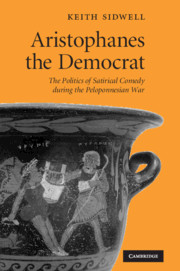Book contents
- Frontmatter
- Contents
- Detail of illustration
- Preface
- Acknowledgements
- List of abbreviations
- PART I SETTING THE STAGE
- PART II THE POETS' WAR
- 4 Acharnians: Parabasis versus play
- 5 Metacomedy, caricature and politics from Knights to Peace
- 6 Metacomedy, caricature and politics from Autolycus to Frogs
- Conclusions and consequences
- PART III APPENDICES
- Bibliography
- Index
- Index Locorum
- Index of Modern Scholars
6 - Metacomedy, caricature and politics from Autolycus to Frogs
from PART II - THE POETS' WAR
Published online by Cambridge University Press: 27 January 2010
- Frontmatter
- Contents
- Detail of illustration
- Preface
- Acknowledgements
- List of abbreviations
- PART I SETTING THE STAGE
- PART II THE POETS' WAR
- 4 Acharnians: Parabasis versus play
- 5 Metacomedy, caricature and politics from Knights to Peace
- 6 Metacomedy, caricature and politics from Autolycus to Frogs
- Conclusions and consequences
- PART III APPENDICES
- Bibliography
- Index
- Index Locorum
- Index of Modern Scholars
Summary
THE ARCHON AND POLITICAL COMEDY
The records of comic production for the years between the beginning of the Archidamian War and the renewal of the conflict prompt the question, how did the archon make his selections of what would go on at the festivals, especially in the light of his knowledge of the seriously political nature of the genre? It is clear from the productions of the 420s that competing political interests were pretty well represented, if the argument so far is accepted. Both anti- and pro-war poets were able to get their comedies into the major festivals, and supporters of Cleon, Hyperbolus and Alcibiades managed to have their respective say. The ebb and flow of judgement is another matter, of course, and Aristophanes' lack of success after 424 may suggest, as I have noted above, a political shift towards the peace-party. Things are more difficult to judge between 420 and 414, because our records are lacunose. However, we have no firm date of production for an Aristophanes play between Dionysia 421 and Birds in 414. For Eupolis, on the other hand, 421 was a bumper year, in which he competed with Marikas at the Lenaea and won with Kolakes at the Dionysia. In 420 came one of the versions of Autolykos. His Baptai must also belong to this period, since it appears to have attacked Alcibiades and he was off the scene by summer 415.
- Type
- Chapter
- Information
- Aristophanes the DemocratThe Politics of Satirical Comedy during the Peloponnesian War, pp. 217 - 298Publisher: Cambridge University PressPrint publication year: 2009



